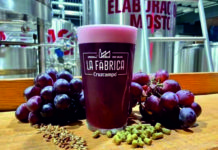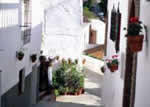
Extracts from the best selling book "In the Garlic" by Valerie Collins and Theresa O'Shea Stay a while in Spain, and beyond the sunshine, fiestas, Rioja and laidbackness you may find yourself drifting in an uncharted ocean of unwritten laws, linguistic minefields and mysterious quirks. You need to be In the Garlic – en el ajo – in the know.
Tela – Material, cloth, canvas, colloquial term for money. Tela, or tela marinera (literally, sailcloth), is also used to refer to a task that is long or difficult or problematic. The paperwork involved in buying a house, for example, tiene tela, and — though Don Quixote may be fun — at 1072 pages (Penguin, paperback) tiene mucha tela. Sometimes you will hear it used in an exclamation, as in “¡Vaya tela!" What a job! / That's one hell of a job!
Tertulia – In the bar on the corner of Valerie's street, every afternoon around merienda time, the same group of local elderly women gather, some from her building. They push a few tables together and talk and talk and talk, making a coffee last all evening. This is a tertulia. In the same bar, there's another tertulia, of elderly men. The group of mates who huddle together on Monday mornings to post-mortem the weekend's football is a tertulia. (Never try to do business on a Monday morning.) Originally a literary gathering, a bit like a salon but usually in a public place (i.e. a bar), the tertulia is more broadly any same-time, same-place gathering of like-minded people, typical of Spanish cafe society. And the word has been aptly pressed into service to refer to radio and TV talk shows. A member of a tertulia is a contertulio or a tertuliano.
Tío/Tía – Uncle and aunt. If you're talking about both of them, you say tíos. Your great aunt is your tíá abuela (literally your grandmother aunt) and your mother or father's brother is your tío carnal. Oh, and tío and tía are also colloquial terms for 'guy' and 'girl'.
Tío bueno/Tía buena – You're walking down the street, a car slows down behind you and the window slides down: “!Tía buen-aaaaa!” Depending on your age/mood/die-hard-with-a-vengeance degree of feminism you blush, smile, scowl, swear or ignore. The verbal equivalent of a wolf whistle.
Tuna – Not a large fish, but a wandering band of student minstrels that keeps alive, almost unchanged, a tradition dating back to the 13th century. Amazing, in these digital days, how many of Spain's future lawyers and doctors, architects, engineers and other pillars of society still prance around in velvet bloomers and beribboned capes, singing 'typical espanish' songs, serenading women under balconies and getting buckets of water sloshed over them by sleepless neighbours. It all started in Palencia, where the first studium generale, the forerunner of the university, was founded in 1212. Young men flocked there, and those too poor to pay their way busked in inns, taverns and medieval greasy spoons for a few coins and a bowl of soup. When night fell and the curfew sounded, they wandered around town, strumming their lutes, singing popular songs under women's balconies and raising hell. Since then, essentially, nothing has changed, and every university faculty has its tuna. Like other male institutions, at its best it's about unfashionable stuff like discipline, commitment, companionship, loyalty, honour, character building. Perhaps this is why it has endured.
In the Garlic: Your Informative, Fun Guide to Spain is published by Santana and is available at all good book shops
(ISBN 13:978-84-89954-59-5)
©Valerie Collins and Theresa O'Shea 2008






















